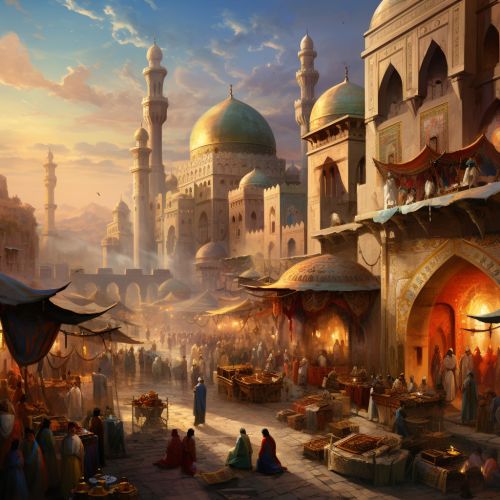Islamic Golden Age
Introduction
The Islamic Golden Age refers to a period in the history of Islam, traditionally dated from the 8th century to the 14th century, during which much of the historically Islamic world was ruled by various caliphates and science, economic development, and cultural works flourished. This period is traditionally understood to have begun during the reign of the Abbasid caliph Harun al-Rashid (786 to 809) with the inauguration of the House of Wisdom in Baghdad, where scholars from various parts of the world sought to translate and gather all the world's knowledge into Arabic.
Historical Context
The Islamic Golden Age is traditionally dated from the mid-7th century to the mid-13th century at which Muslim rulers established one of the largest empires in history. During this period, artists, engineers, scholars, poets, philosophers, geographers, and traders in the Islamic world contributed to agriculture, the arts, economics, industry, law, literature, navigation, philosophy, sciences, sociology, and technology, both by preserving earlier traditions and by adding inventions and innovations of their own.


Intellectual Achievements
During the Islamic Golden Age, scholars and scientists in the Islamic world made many significant contributions to world knowledge in many different fields such as the arts, astronomy, literature, medicine, and philosophy. The Islamic Golden Age was a period of cultural, economic, and scientific flourishing in the history of Islam, traditionally dated from the 8th century to the 14th century. This period is traditionally understood to have begun during the reign of the Abbasid caliph Harun al-Rashid (786 to 809) with the inauguration of the House of Wisdom in Baghdad, where scholars from various parts of the world sought to translate and gather all the world's knowledge into Arabic.
Astronomy
Islamic astronomers were some of the first to question the assumptions of Ptolemaic astronomy, which had been accepted as fact by other civilizations. They contributed to the world's understanding of astronomy by making observations, building instruments, and setting up observatories. They also determined many astronomical parameters, such as the Earth's circumference, with unprecedented accuracy.
Medicine
The field of medicine also saw significant advances during the Islamic Golden Age. Physicians in the Islamic world during the 9th and 10th centuries compiled medical knowledge from the Greek and Roman traditions, as well as from Persian and Indian sources, into encyclopedic works of their own. These works, such as "The Canon of Medicine" by Avicenna, served as authoritative medical textbooks for centuries afterwards.
Philosophy
In the field of philosophy, Islamic philosophers such as Al-Farabi, Avicenna, and Averroes made significant contributions to philosophical thought, particularly in the areas of Aristotelian philosophy and Neoplatonism. They also made important contributions to logic, ethics, and metaphysics, which had a profound influence on the development of European philosophy during the Renaissance.
Cultural Achievements
The Islamic Golden Age was not only a period of scientific discovery, but also a time of great cultural achievements in fields such as architecture, art, literature, and music. Islamic artists developed a unique style of decoration characterized by complex geometric patterns, calligraphy, and a vivid palette of colors. This style was applied to a wide range of media, including textiles, ceramics, metalwork, and architecture.
Architecture
Islamic architecture during the Golden Age was influenced by a number of earlier styles including Roman, Byzantine, and Persian designs. However, it also developed distinctive features of its own such as the horseshoe arch, the dome, and the minaret. Notable examples of Islamic architecture from this period include the Great Mosque of Cordoba, the Alhambra in Granada, and the Great Mosque of Samarra.
Literature
In the realm of literature, the Islamic Golden Age saw the production of many works of poetry and prose in Arabic, Persian, and Turkish. The most famous of these is undoubtedly the "Thousand and One Nights", a collection of folk tales, fables, and legends which was compiled during the Golden Age. Other significant works include the poetry of Rumi and Hafez, and the philosophical writings of Avicenna and Averroes.
Conclusion
The Islamic Golden Age was a period of remarkable achievements in various fields of knowledge. It was a time when Islamic civilization led the world in terms of scientific, cultural, and intellectual development. The legacy of this period continues to influence our world today, from the scientific method to architecture to literature.
